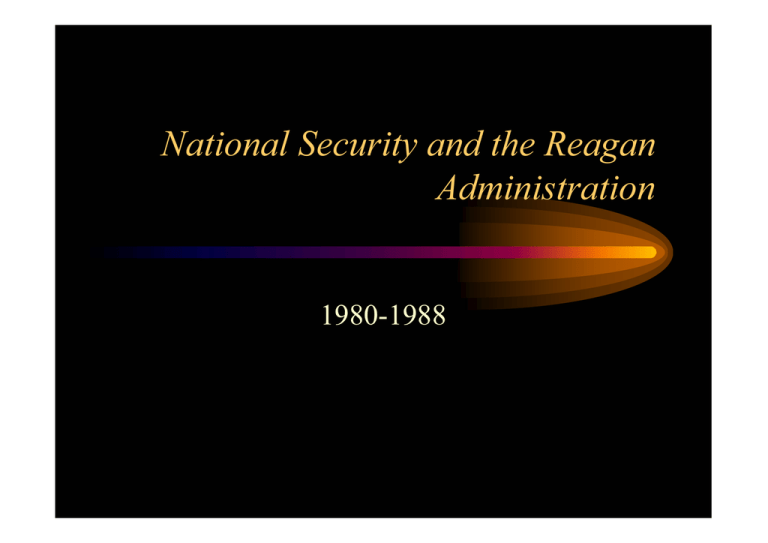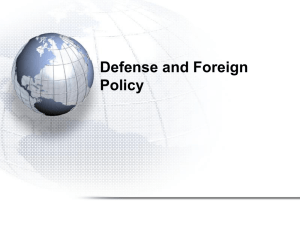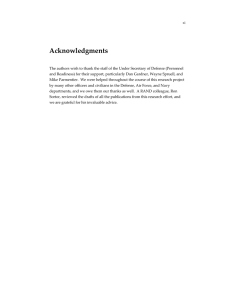National Security and the Reagan Administration 1980-1988
advertisement

National Security and the Reagan Administration 1980-1988 The Setting: 1980 • Soviet Global Engagement – – – – • Africa/Middle East Latin America Europe (peace offensive) Asia (Cambodia, Afghanistan) US Decline – – – – – Iran hostages Vietnam Largest reduction in US military capabilities relative to USSR during Cold War [Gaddis] weakened US presidency weakened NATO Reagan National Security Orientation • Nixon/Kissinger/Carter Policy of Arms Control Î US Decline USSR was now overextended • – – – USSR had constraining domestic problems – economy, technology USSR would not risk a real confrontation with US Soviets afraid of toughness • other countries would respect new U.S. assertiveness Reagan National Security Orientation • Democracy was sweeping the developing world – tide of history favors western democracies & capitalism • (opposite Marxist-Leninist philosophy) Î Reagan Doctrine: reversing Soviet gains by "undermining" weak communist regimes outside E. Europe • – – US analogue to wars of national liberation -- major segments of society resist communist regime support anti-communist insurgents to point were economic, political, social, governmental costs place heavy burden on USSR Reagan National Security Orientation • • “Decade of Neglect” & “Window of Vulnerability” ÎUS could be resurgent with new defense investment Policy Implementation • Reinvesting in Defense – All forces • • • Use of Force to Reestablish Reputation Covert Operations Arms Control – as political response to domestic & European peace movement Reinvesting in Defense • Defense Budget – $2.4 trillion ($600 million increase over Carter budget) – 1980-1985 longest sustained peacetime military budget buildup in 20th Century – Defense sector inflation hobbles real growth in defense capabilities Reagan Defense Programs • Strategic Forces (Defense Guidance 1982) – MX – Cruise Missiles • ALCM, SLCM, GLCM – B-1 & B2 – Trident SSBN/SLBM – SDI & strategic defense Reagan Defense Programs • General Purpose Forces – Navy • Maritime strategy & 600 ship Navy – Army • New hi-tech force – – M-1 Bradley fighting vehicle Use of Force • Grenada (1983) –warning to Soviets/Cubans – 6 day amphibious/air assault liberates Grenada – government factional infighting – US enters to rescue 53 US medical students – 6000 US troops (19 killed) – Cuban soldiers (>100 killed) Use of Force • Libya(1986) – – – • NSA evidence of Libyan involvement in FRG bombing of US troops in night club F-111s in UK & Navy carrier Aircraft raid Libya (punish & deter) France refuses overflight US Builds Persian Gulf Forces – – – air & naval bases (in Saudi Arabia; airbases 5x bigger than Saudi airforce) mine clearing in Gulf (Iran - Iraq War) Vincennes accidental Shoot Down of Iranian airliner (1988) Covert Operations • Nicaragua – 1981-1990: US Builds up Contras • Afghanistan – 1980-1990: aid to Mujahadeen to fight Soviets Arms Control • US & European "Peace Movement" & "Nuclear Freeze" Movement Î Arms Control – Public Opinion Affects National Security Policy • US Admin. Aggressive tone seen as more dangerous than Soviet military buildup – US & European public opinion Î peace movement – – • US domestic calls for US troops to leave Europe; 1/2 US defense budget goes to conventional defense of Europe many Europeans think NATO is an anachronism Nuclear Winter Thesis Arms Control • “0-0 Option” as Political Move – – – Pershing II, GLCM (300 rvs) v. SS-20s (1400rvs) lessen domestic pressures against US deployments INF Treaty (1987/1988) • • • 1/1984 Soviets walk out of negotiations; increases European anti-US feelings 1987 the return/1988 Gorbachev accepts START – – – To weaken US Nuclear Freeze Movement Goal of 50% reduction in SNF Negotiations almost complete by 1989 END Grenada back Central America back Libya (1986) back Persian Gulf back INF Treaty Soviet SS-20 INF Treaty U.S. Pershing II U.S. GLCM Back U.S. Defense Budget back U.S. Spending 360 340 $ billions (1992) 320 300 280 260 240 220 200 1960 1970 1980 Year 1990 2000 back



